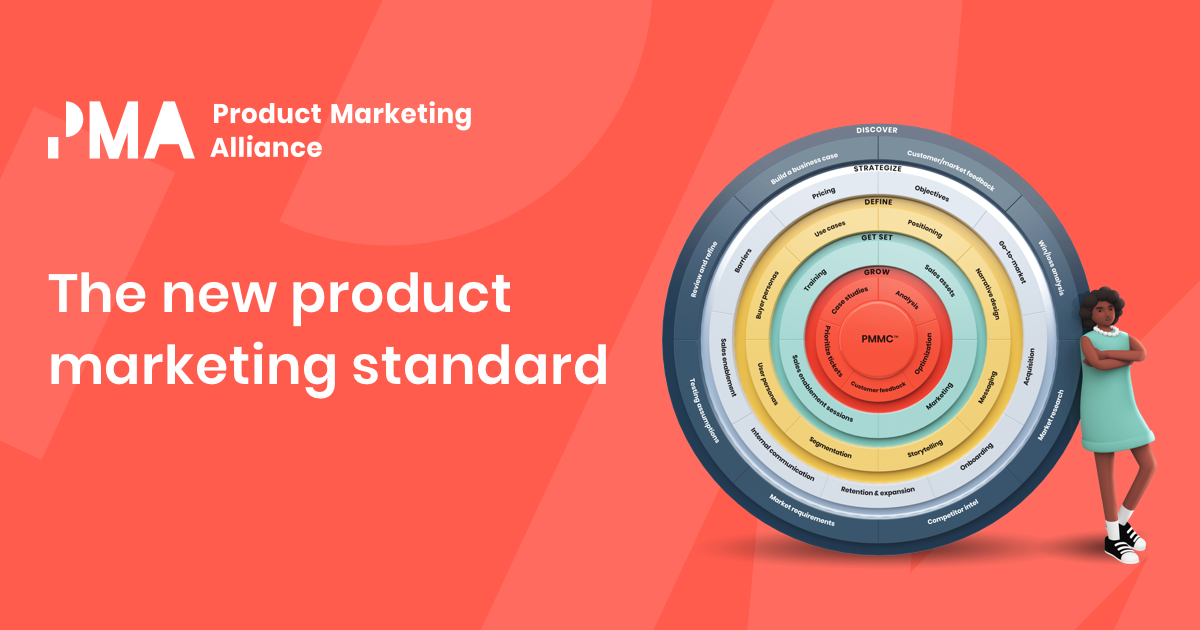The product roadmap is the most important communication and planning tool that your product management counterparts own. The roadmap offers a high-level visual summary of the product vision and the direction your product will be taking over time.
Depending on the company you work for, your product roadmap may include upcoming features and feature improvements, integrations, and other technical considerations.
If you don’t have consistent visibility and easy access to your product roadmap, you’ll need to advocate for that visibility and access, so put it on your to-do list immediately to reach out to your product management function and request this access, as well as a walk-through.
One of the most common frustrations in collaborating with product managers is the desire to be brought in sooner in the process. Product marketers want to be brought in early in the discovery phase when the decisions are being made about what type of functionality to build and for whom.

Unfortunately, many product marketers instead find themselves being brought in far more reactively, when functionality is already in development or - far worse - is ready to be released.
How do we change this dynamic? To earn trust and be seen as a partner to Product, you need to focus on adding value. This is how we earn our seats in those earlier conversations.
So, what role exactly does Product Marketing play when it comes to the roadmap and how do we add value? You should aim to act as a key contributor and a champion of the product roadmap. Let’s talk about what this looks like.
While the go-to-market motion is typically owned by Product Marketing, the product roadmap is owned by Product Management. Although this is commonly understood, it’s important for Product Marketing to remember that as we approach conversations about the roadmap.
We can and should have a unique level of understanding and access to the product roadmap, but we should seek to influence the roadmap and partner on roadmap strategy and communication without overstepping. Accidentally overstep here and you may run the risk of damaging your relationship with product management.
This is because the product roadmap and overarching product strategy are often going to be very hot, sometimes heavily debated topics of conversation within the organization, impacting many cross-functional teams who are all very invested in different ways.
Customer Success Managers are hearing feedback from customers who are threatening to churn if certain features aren’t prioritized on the roadmap. Sales may believe they are losing deals to the competition based on the lack of integrations and will push for their inclusion on the roadmap
Even the C-suite, founders and investors are likely to have opinions about the roadmap. That’s a lot to take in!
In fact, one of the most challenging aspects of being a product manager can be managing the various stakeholders who would seek to influence the product roadmap, and so in some organizations, the product roadmap can be a touchy subject for Product Managers. This is an opportunity for Product Marketers to lean into our empathy.
How to position yourself as a partner
Rather than being one more voice clamoring for attention, we should aim to again position ourselves as partners. There are three ways that I would suggest you do this.
- Provide insights and context that help product managers make roadmap decisions
- Assist in communicating the roadmap in a scalable way
- Publicly support and help contextualize roadmap decisions that have been made
Let’s dive into each of these a bit more.
Filter through the noise
One of the most valuable roles Product Marketing can play is to help the Product team filter through all the noise.
Where possible, you can provide product managers with additional data and context to be able to make product roadmap decisions effectively, so that they can be communicated throughout the organization with confidence.
A few examples of the kinds of insights that can be valuable inputs for Product Management include aggregated data on why your company wins and loses new business deals, information on customers that churn for product-related reasons, and information about other competitive solutions in the marketplace.
Communicate the scalability of the roadmap
Next, assist them in communicating the roadmap in a scalable way. Your product roadmap may be internal-facing only, customer-facing, or even market-facing. You may also have different versions of your roadmap for different audiences.
Product Managers want and need to have ownership over roadmap decisions, but I’ve found them to be far less territorial when it comes to communicating those decisions. They often welcome support here, and this can give you a great foot in the door when it comes to being involved in roadmap conversations.
At my organization, we have an internal-facing roadmap that’s reviewed and updated weekly by the product management team, and then progress on the roadmap is discussed bi-weekly with a cross-functional go-to-market team.
Quarterly, Product Management and Product Marketing collaborate to update two slides that are made available for use by our Sales and Customer Success teams. These two slides communicate what might be considered an edited version of our product roadmap.
On the first slide we highlight three different areas: recently released features, features that are coming soon, and features that are coming next. On the second slide, we provide a little bit more context on some of the bigger, more exciting features that are in those coming soon & coming next buckets.
Customer success loves to leverage these slides in renewal conversations to demonstrate momentum and show all of the functionality we’re continually adding to our product.
Sales will also leverage these slides later on in the sales cycle to demonstrate transparency and get prospects excited about our focus on always building more value for our customers.
By making these slides available, Product Marketing is able to help streamline much of the roadmap questions and conversations that might otherwise have to be fielded by Product Managers on a more ad hoc basis.
This is just one example - you may find that a different form of communication makes sense for your company and your roadmap. Brainstorm with your product management team and test out some ideas!
Publicly support Product Managers
Finally, your product managers will always be grateful for your public support of their roadmap decisions. And they’ll be far more enthusiastic about discussing their reasons for those roadmap decisions with you if they know that you’ll use that information to help them communicate with the rest of the organization.
It can be helpful to remember and to reinforce with others that the Product Manager’s main goal is to drive business value by creating an exceptional customer experience. This is a goal that everyone across the organization should be able to relate to and empathize with - and it’s not an easy one to execute.
There’ll almost by nature be disagreements about how to achieve this. And this is why the ongoing conversation about the product roadmap is important and highly strategic. Passion around this topic is a good thing and it can signal that employees care and are engaged.
Sometimes, items on the roadmap will be deprioritized or even removed from the roadmap entirely. This can be a cause for frustration across the organization.
As many Product Managers will remind us, roadmaps are designed to communicate intent, not commitment. This is an important distinction, and it’s one that many stakeholders across the organization struggle with.
Roadmaps are plans that are subject to shift based on changing market conditions or evolving company objectives.
Product Marketing can offer support to the Product team by reinforcing this message across the company, and by again helping to communicate the context around why and how product roadmap decisions are being made.
This'll be greatly appreciated by the Product organization, and is a fantastic way to position yourself as a trusted partner.
Learn the A-Z of product marketing
PMA is the one-stop hub for product marketing insights, but if you’re looking to assimilate every aspect of the role, prove your strategic value, and climb new mountains in your career - Product Marketing Certified: Core is your best companion. 💕
Accredited by the CIM & CIPD, and trusted by brands like Sky, HubSpot, Adobe, TikTok, & more, you’ll journey through a training program that uncovers the skills, knowledge, and tools to unleash your product marketing productivity.
Enroll today, and change your career trajectory from tomorrow.


















 Follow us on LinkedIn
Follow us on LinkedIn




.svg?v=3a7706f2ad)